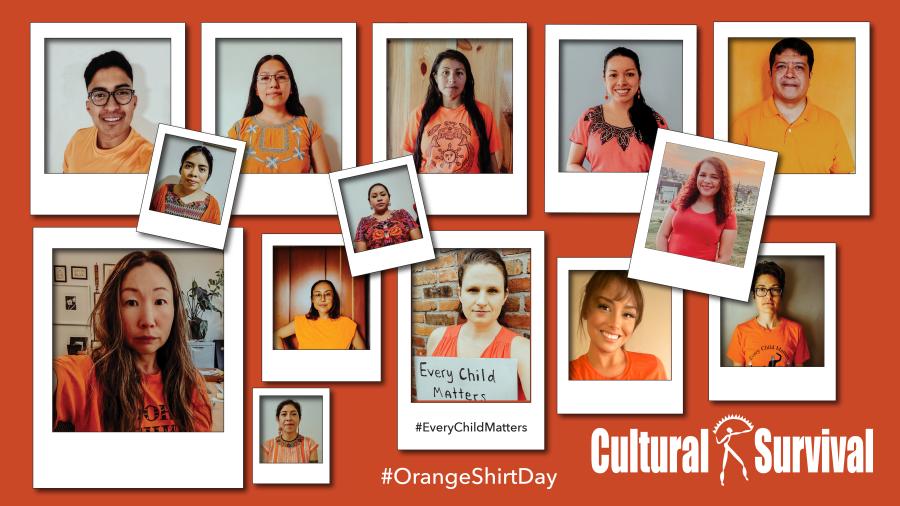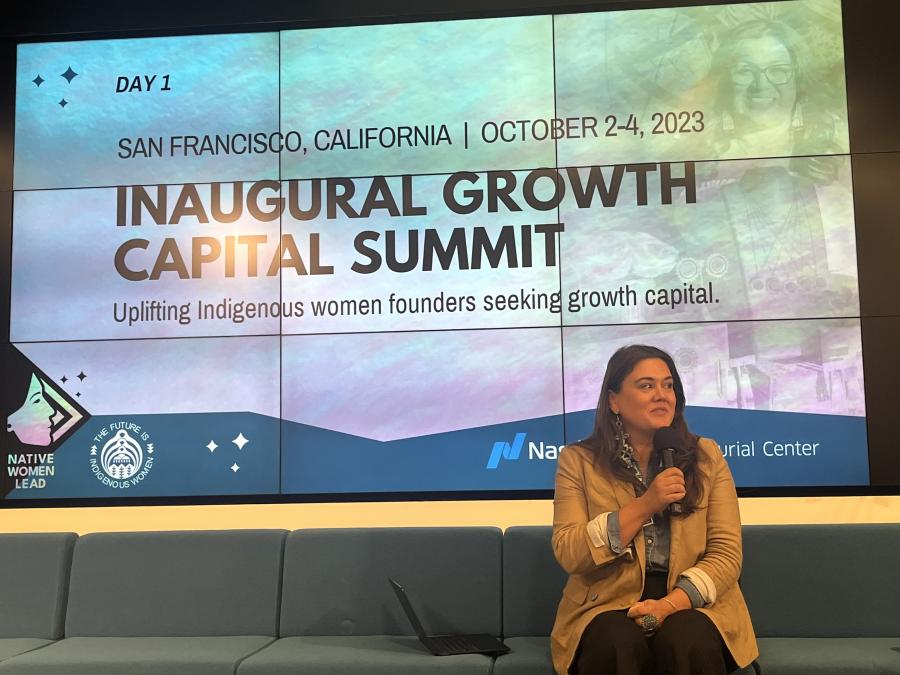We picked some 200 cucumbers and 30 stunningly beautiful yellow squash from the garden on a hot August day after weeding and watering. We drove through the Lake Andes housing development area with a van laden with the harvest. Many residents knew why we were there, and some came towards our van to talk about how good the cucumbers were from the previous distribution. Their eyes glittered as they caught sight of the squash. It was the first harvest of the year for the squash, and all kinds of questions and comments flew at us at once:
“Are these from the garden? They look way better than the ones sold in the store…”
“This looks so nice. May I have one?”
“I still have some of the cucumbers left from last time, they are delicious.”
“How do you grow this? Is there any special soil or fertilizer involved?”
I spent a month with the grassroots nonprofit organization Brave Heart Society as a representative of Seva Foundation, which supported Brave Heart’s food sovereignty activities this year on the Yankton Indian Reservation in South Dakota. Brave Heart, supervised by a group of community grandmothers called the Unci Circle, is dedicated to restoring endangered and lost cultural practices to heal the wounds endured by the Lakota, Nakota, and Dakota peoples. This process of restoration is decidedly community-driven: “We’re one of the most underserved communities out there, and we know we can’t wait around for someone else,” a community member explained. “We can’t wait for someone to do right by us, so we have to do it ourselves.”
One of Brave Heart Society’s activities is to revive an old gardening circle called Woju Okodakiciye, or Planter’s Society. The Planter’s Society was begun by three Ihanktonwan grandfathers around 1875–1880, and is known for having advocated for Native food independence. When asked about the significance of the Planter’s Society to Brave Heart’s mission, Faith Spotted Eagle, the volunteer manager of Brave Heart, explained, “Grandfather Philip and others could see that with the captivity of the Yanktons on the reservation with limited annuities that were stolen by unscrupulous government agents and no game to hunt, starvation was ensuing . . . . The Planters Society encouraged larger-scale planting of gardens, and the Yanktons for a period became good farmers and horse breeders.”
Faith added, “The importance of reviving the Planter's Society lies in its history of self-sufficiency, kinship with the land despite all odds, and religious tolerance, as Mother Earth is the mother of all . . . . Upon planting the first seeds in the revival, we prayed to these grandfathers for their guidance.” Brave Heart Society and its volunteers see gardening as a way to continue in this tradition by breaking away from dependence on often-unhealthy foods bought from the convenience stores and food markets.
Brave Heart Society reignited the dreams and insights of those visionary ancestors as it started cultivating Cante Waste Woju (Good Heart Garden) in 2003 with funding from Running Strong for American Indian Youth, Honor the Earth, and Seva Foundation. Community members from all walks of life are noticing a swell of public interest in healthy food and healthy ways of life as a result.
In an area with many convenience stores and few food vendors, but surrounded by open and flat land, it can be easy to question why the Ihanktonwan don’t grow more food and why the primary food source is those stores.
“You can’t tell people to garden; it wouldn’t work,” said Chris Ross (Potawatamie), a musician and a volunteer at Brave Heart. “The first step is to show people the benefits of gardening through distributing produce. You can’t force change around here. There’s a lot of trauma. There’s cautiousness. It’s generational. These seeds that are being planted mentally, that’s what’s going to change things.”
“In today’s world where it’s all instant gratification, the garden keeps people remembering the rewards of the hard work,” says Kip Collins Spotted Eagle, who organized and led other community members to till the garden spaces, and also managed and maintained the garden and supervised produce distribution. “I’d hope it helps the young people have a better work ethic.”
Michael Flyinghawk, 20, a constant volunteer at Brave Heart Society, says that weeding and watering taught him important community values. “Gardening teaches patience,” he says, “and makes me feel grounded because now I know where my foods are coming from, how much work it takes, and that they are not contaminated by some weird chemicals. I learn something new about the plants, too.” Chris Ross agrees: “When I’m out there [in the garden] it feels right. Working at a job you don’t feel satiated like in a garden. Its hard work, but it feels right.”
Brave Heart Society volunteers also distribute the garden produce to the community elders and low-income families after each harvest. Ross, recounting his summer distribution experiences, recalled, “The kids would say, ‘Hey we’ve got cucumbers . . . we should start a garden, too.’ And some elders would remember and reply, ‘Yeah we do need to. We used to have a garden.’ Everywhere we went with those cucumbers, everyone wanted to stop, laugh, and talk. It broke the barriers. Everybody’s saying ‘I want one. I want to learn.’”
The interaction allowed through such distribution opens dialogue between community members and makes them curious about gardening and the notion of food sovereignty. “We were completely reliant on outside foods,” said one volunteer. “That’s not healthy.” “It’s not enough to think sovereign,” another said. “You have to act sovereign. You don’t have to buy what’s out there.”
Brave Heart Society revived many sacred ceremonies, such as the Sun Dance and Isnati Girls Coming of Age Ceremony, but having foods for the ceremony that were grown on the community land—by community hands—reaches people in a special way. Jennifer Takes War Bonnet, who volunteers as the cultural advocate for Brave Heart Society, joined the organization late 2009, soon after she moved to Ihanktonwan community from the Oglala Tribe of Sioux Nation. She said that she realized the importance of community gardening while she was organizing this year’s Isnati: “When the Isnati girls went through the ceremony, they worked on the garden as part of the ceremony, and I think it really taught them the four virtues of being a Native woman: being fruitful, faithful, industrious, and hospitable. It was good for the girls to go through the garden and see through their own eyes the fruits of work and to experience that process in person. I could see through their eyes how happy and proud they were while working on the garden. That experience adds much significance to the ceremony itself and it affects the lives of these young girls spiritually.”
Looking ahead, Brave Heart Society and many general community members express hope for the continuation of the garden and fulfilling the visions of the old Planter’s Society. “We’re starting to think outside of the box,” one Brave Heart Society volunteer said. “We don’t have to get everything from the store.”
By bringing back the Planter’s Society food-independence tradition, by forming bonds across the housing development areas, and by sourcing food for the Sun Dance and Isnati ceremonies from the Cante Waste Woju, Brave Heart volunteers are breaking down the individual mindset and restoring a communal notion of food and traditional values among the Ihanktonwan. To heal the spiritual, mental, and physical wounds left by injustice, “it starts with something as simple as food.”
Namgyal Tsepak is a native of Tibet working as a research associate at Seva Foundation, supported by Duke University’s Hart Fellowship Program. He is a recent Duke University graduate, majoring in cultural anthropology. He can be reached at ncaihua@seva.org.
This article is second in a three-part series from Seva Foundation’s Native American Community Healthy Program, spotlighting stories from indigenous communities in Alaska, South Dakota, and California as they recover ancestral food systems that prevent chronic disease and promote self-reliance. For more information on the Brave Heart project please visit www.seva.org/braveheart.



